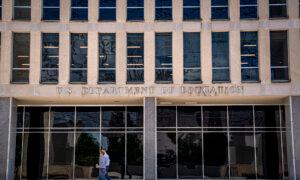Paper checks impose unnecessary costs and are more subject to fraud, the president says. Another order centralizes payments in the Treasure Dept.
President Donald Trump signed an executive order March 25 calling for the Treasury Department to use electronic payments instead of paper checks, a step aimed at reducing waste and fraud.
White House staff secretary Will Scharf pointed out some of the shortcomings of paper checks. “Historically, checks issued by the Treasury are, I believe, 14 times more likely to become the subject of fraud than electronic transfer payments,” he said.
According to the order, the Treasury secretary must stop issuing paper checks by Sept. 30, with exceptions for “individuals who do not have access to banking services or electronic payment systems” and ”certain emergency payments where electronic disbursement would cause undue hardship.”
All executive departments and agencies will switch to electronic methods such as “direct deposit, debit/credit card payments, digital wallets, and real-time transfers,” the fact sheet said.
Trump expressed his confidence in the new secretary of the Treasury, Scott Bessent, who wanted a modernization of methods and equipment, and added that there were more upgrades on the way.
“It’s something that should have been done 25, 30 years ago,” President Trump said.
A second executive order, also signed Tuesday, looks to eliminate non-Treasury disbursing offices and centralize the government payment process in the Treasury Department itself.
“Instead of having lots of different departments and agencies and offices issuing payment often without justification, often without any provided rationale, we’re going to be central in payment processes where possible,” Scharf said.
In fiscal year 2024, those disbursing offices shelled out 181 million payments totaling more than $1.5 trillion, accounting for 20 percent of all federal outlays, according to the order.
“This fragmentation of disbursing authority, together with the proliferation of nonstandard financial management systems across the federal government, leads to expensive, disjointed, and duplicative financial reporting, lack of financial traceability, complicated financial management, opacity, increased operational risks, and decreased ability of the Department of the Treasury to provide centralized oversight,” the order stated.
The consolidation will be undertaken by the Treasury secretary and the director of the Office of Management and Budget, Russell Vought. The order directs the Treasury secretary “within 30 days” to assess the disbursing authority that has been delegated to agencies and issue revocation notices where appropriate.
Original News Source Link – Epoch Times
Running For Office? Conservative Campaign Consulting – Election Day Strategies!


